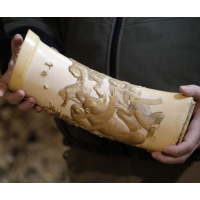NRA and Musicians Share Concern over Ban on Sales of Ivory
 Elephant ivory tusk carved into art piece (photo: Ed Andrieski, AP)
Elephant ivory tusk carved into art piece (photo: Ed Andrieski, AP)
The Obama administration wants to help stop the slaughter of endangered elephants by blocking the sale of ivory in the United States. But the new rules have sparked outrage from a coalition of musicians, gun owners and others who say the ban unfairly restricts the sale of their own possessions that feature ivory elements.
The regulations, developed by the U.S. Fish and Wildlife Service (FWS), would prohibit Americans from importing and largely exporting any item that contains even a small amount of ivory. Interstate sale of goods containing ivory also would become illegal for the most part.
Administration officials say the rules are needed to end the killing of African elephants, which number about 500,000. As many as 35,000 are killed each year by poachers who sell the animals’ tusks on the international black-market.
“We are seeing record high demand for wildlife products that is having a devastating impact, with species like elephants and rhinos facing the risk of significant decline or even extinction,” Interior Secretary Sally Jewell said in a press release. “A commercial ban is a critical element in the President’s strategy to stop illegal wildlife trafficking and to shut down criminal markets that encourage poaching.”
Daniel Ashe, FWS’ director, told Congress last month that the U.S. market “is contributing to the crisis now threatening the African elephant.”
The federal government has seized six tons of illegal ivory smuggled into the country since the late 1980s.
Many owners of ivory-inlaid goods say they sympathize with the plight of the elephants, but say the regulations unfairly punish them.
“I’m blindsided, as are all of us, by this regulatory change,” Lark Mason, a New York auctioneer who specializes in antique ivory, told The New York Times. “We all want to save elephants,” he said, but he questioned how “denying the sale of an 18th-century snuff bottle,” among millions of other decorative antiques, will accomplish that end. Mason has already pulled $500,000 worth of artifacts containing ivory from an upcoming sale because he believes the loss of their resale value will discourage bidders.
Numerous trade groups oppose the regulations, including the National Association of Music Makers, the Art and Antiques Dealers League of America and the National Rifle Association.
Opponents include celebrities like Grammy-winning musician Vince Gill, who fears he won’t be able to take any of his 40 classic Martin guitars featuring ivory pegs and bridges overseas.
The opposition wants the rules rewritten to account for ivory that has been in the U.S. for generations.
“I am not in any way trying to diminish the fact that this is going to have an impact on many different industries,” Craig Hoover, chief of FWS’ Wildlife Trade and Conservation branch, told the Times. His colleague Bryan Arroyo added, “I regret that the ban is creating a lot of anger in some quarters.”
Hoover did say officials are reviewing adjustments to the regulations, which are expected to go into effect by June.
-Noel Brinkerhoff
To Learn More:
Limits on Ivory Sales, Meant to Protect Elephants, Set Off Wide Concerns (by Tom Mashberg, New York Times)
Interior Announces Ban on Commercial Trade of Ivory as Part of Overall Effort to Combat Poaching, Wildlife Trafficking (Department of the Interior)
China Gov't-Owned Crafts Chain Suspends Controversial Ivory Sales (by Clare Baldwin, Reuters)
U.S. Prepares to Destroy 6 Tons of Illegal Ivory (by Noel Brinkerhoff, AllGov)
- Top Stories
- Unusual News
- Where is the Money Going?
- Controversies
- U.S. and the World
- Appointments and Resignations
- Latest News
- Musk and Trump Fire Members of Congress
- Trump Calls for Violent Street Demonstrations Against Himself
- Trump Changes Name of Republican Party
- The 2024 Election By the Numbers
- Bashar al-Assad—The Fall of a Rabid AntiSemite






Comments